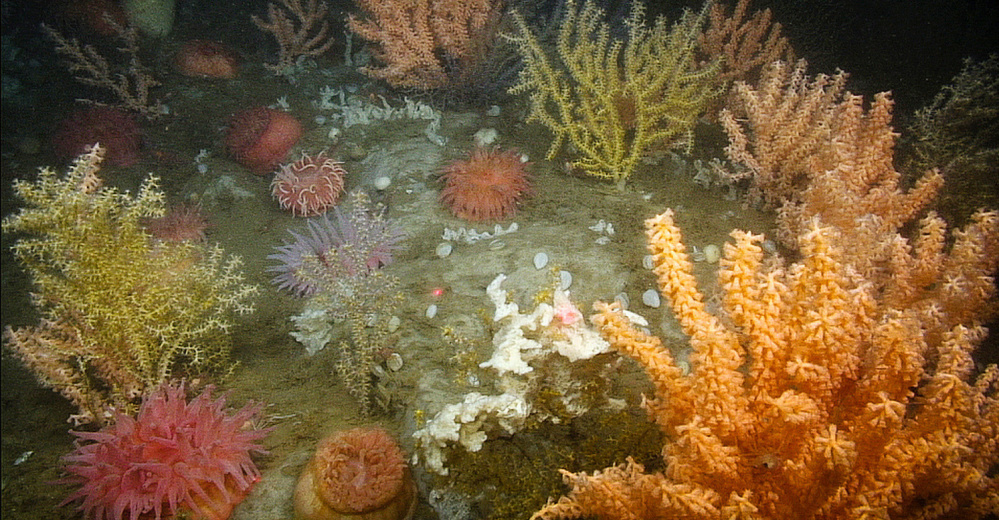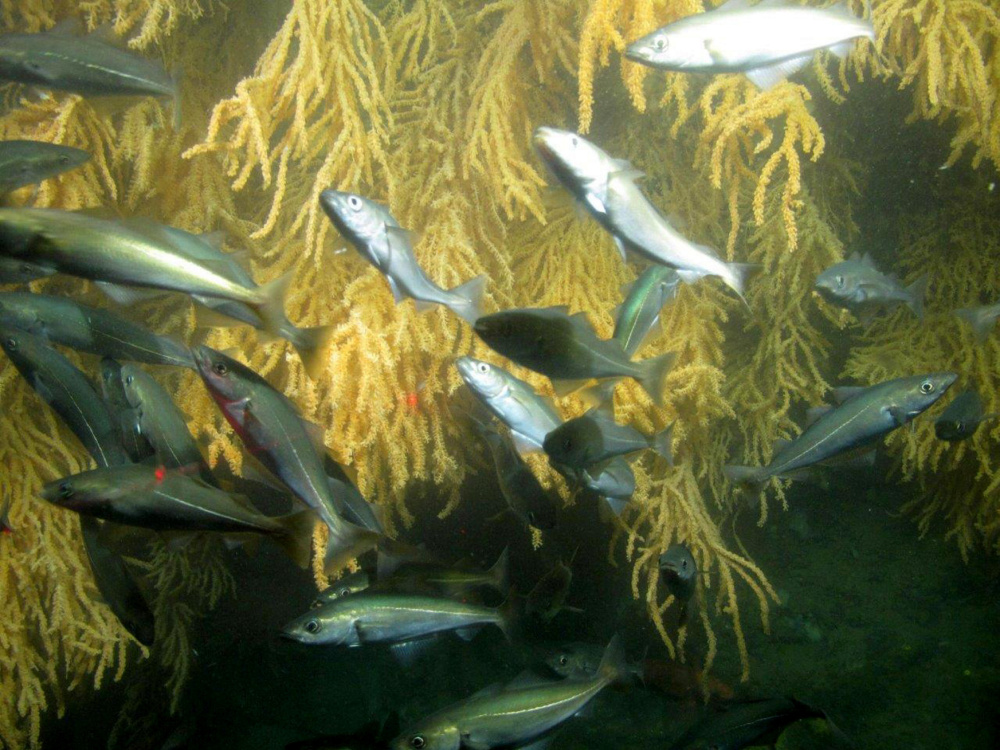Over 400 Maine lobstermen could lose their traditional fishing territory under a proposal to protect deep-sea corals in the Gulf of Maine.
The New England Fishery Management Council is considering a plan that would ban fishing in four designated coral zones spanning about 161 miles of federal waters in the Gulf of Maine – Mount Desert Rock, Outer Schoodic Ridge, Jordan Basin and Lindenkohl Knoll. Here, often on steep rock walls deep under water where sunlight cannot penetrate, scientists have found dense, delicate and slow-growing coral gardens of sea whips, fans and pens.
These coral habitats have become increasingly rare, suffering from centuries of damage from fishing gear. The council wants to protect these corals, which provide shelter, food and refuge to fish such as cod, silver hake and pollock, and serve as an essential habitat for larval redfish. A sister organization has already created deep-sea coral protection zones in deep mid-Atlantic waters from Long Island to Virginia.
Like most of the Gulf of Maine, the four coral zones under consideration here are home to lobsters. Two of the zones, Mount Desert Rock and Outer Schoodic Ridge, are prime fishing grounds for Maine lobstermen who fish offshore when the lobsters migrate to deeper waters, while the other two are primarily fished by southern New England lobstermen.
The state Department of Marine Resources believes more than 100 lobster boats that launch from at least 15 ports in Down East Maine fish in the 49 square miles of ocean that make up the Mount Desert Rock and Outer Schoodic Ridge coral zones.
While that is a small percentage of the state’s overall lobster fleet, which includes about 6,000 commercial licenses, the more than 400 captains and sternmen who work those boats land more than $4 million worth of lobster from these waters every year, said Terry Stockwell, DMR’s director of external affairs.
“The lobster industry is the most important economic driver in this Down East area,” Stockwell said. “Closing these two areas to lobstering would hurt more than a dozen coastal communities, impact hundreds of jobs. These are important offshore fishing grounds for our year-round fishery. Maine doesn’t oppose the protection of deep-sea corals, but it strongly believes that lobstering should be exempted in these two areas.”
COLLIDING WORLDS
During the cold-weather months, when 52-year-old Jim Dow usually fishes for hard-shell lobsters in deep federal waters, his buoys will encircle Mount Desert Rock, where the lobster is so plentiful that boats will sail for hours to drop traps there. As a result, fishermen call it the Meeting Grounds.
It takes him an hour to sail from Bass Harbor to the Rock, where Dow, a member of the Maine Lobstermen’s Association board, has fished since 2007. If the council adopts a Mount Desert Rock protection zone, Dow will have to move about one-third of the traps he sets in the fall, winter and spring.
“It would have a big impact on me, forcing me to find a new place for my gear in an area that’s already pretty well fished,” Dow said. “Bass Harbor is on Mount Desert Island, but we don’t have big tourism. It is a fishing village. It would be hard. It would be even harder on the island guys.”
Dow said boats out of Swans Island, Frenchboro and Cranberry Island rely on the Rock for winter fishing.
He said word is just starting to spread about the coral protection plan, but he said the fishermen he has talked with say they didn’t even know there was coral in the deep canyons below. He said he’s never found coral in one of his traps, nor have other fishermen who lobster there.
These cold-water coral communities have only recently begun to be surveyed. University of Connecticut marine sciences professor Peter Auster has recently led two survey expeditions that used remotely operated underwater vehicles and cameras to photograph and sample the Gulf of Maine coral zones.
The proposed Outer Schoodic Ridge coral zone is a 31-square-mile area that lies about 25 nautical miles southeast of Mount Desert Island. The terrain there looks like an underwater slot canyon, with depths ranging from 104 to 248 meters. In dives over the last four years, researchers found soft corals such as sea fans and red trees on the short, steep vertical rock faces here, sometimes in dense thickets known as coral gardens.
The proposed Mount Desert Rock coral zone is an 18-square-mile area southwest of Mount Desert Rock, a small island that lies about 20 nautical miles south of Mount Desert Island. Depths range from 100 to 200 meters in this area. Researchers have surveyed this area a half-dozen times since 2002, finding both low-density coral habitats and coral gardens on the high slopes, as well as sea pen beds.
Researchers also have found evidence that fishing has damaged these coral habitats. Auster and others have found scarring on the ocean bottom from trawler boats that drag their nets along the basins, denuding the bottom of most plant life. And while trawling may cause the most damage, lobster pots can get in the rocky crevices where coral gardens now thrive, crushing the coral or ripping it right off the rock.
“Is the footprint of lobster gear smaller than trawl gear? Sure, because traps are smaller,” Auster said. “But their small size also means they are set in places where trawl gear can’t go, the places where the coral still exists. These are the areas we’re trying to protect. Deep-sea corals are vulnerable. They also grow very slowly. If they get damaged, they’re not going to come back anytime soon.”
HEARINGS AHEAD
But Stockwell argues that a fishing ban for these two areas would have unintended consequences for other marine species, including the endangered North Atlantic right whale. The lobstermen being pushed out of the coral zones would be likely to drop their traps in adjacent waters, where right whales feed in higher numbers and are thus more likely to get entangled in trap lines than in the two proposed coral protection zones, Stockwell said.
Ironically, the sinking lines lobstermen must now use to reduce the risk of right whale entanglement also cause greater damage to the corals.
The scramble for new territory could also exacerbate the trap wars that have recently broken out in those zones as more and more fishermen scramble to set their pots in increasingly crowded waters, Stockwell said.
The Maine Marine Patrol has documented one of the most expensive trap wars in decades this past summer, with a conservative estimate of more than $350,000 worth of gear lost as lobstermen scramble for turf.
As vice chairman of the New England Fishery Management Council, Stockwell made a bid to exempt lobstermen from the fishing ban under consideration for Mount Desert Rock and Outer Schoodic Ridge this month at the council’s fall meeting in Providence, Rhode Island, but council members voted it down 11-5, arguing that it was still too early in the development of the proposal to consider an exemption.
The council’s deep-sea coral protection proposal will go out to a series of public hearings in the spring with a range of possible alternatives, including the exemption that would allow continued lobster trapping in protected areas, before the council takes a final vote.
The council could also consider other exemptions for affected fisheries, although lobstermen who fish Mount Desert Rock and Outer Schoodic Ridge say there isn’t much of a groundfish fleet left there to run out. But council data show that the other two proposed Gulf of Maine coral protection zones, Jordan Basin and Lindenkohl Knoll, support monkfish and groundfishing for species such as cod, haddock and pollock.
NO ‘FREE PASS’
If the New England Fishery Management Council approves a coral protection plan, it would go to the National Marine Fisheries Service for final consideration, a process that would involve more public comment, Stockwell said.
He told the council that leaving the lobstering prohibition in the plan would guarantee big, loud crowds at its Maine hearings and could interfere with the council’s efforts to protect deep-sea corals.
Stockwell said the Mid-Atlantic Fishery Management Council’s plan, which is now waiting for National Marine Fisheries Service consideration, exempted lobstering from the fishing ban in coral protection zones.
But John Bullard, regional administrator of the Greater Atlantic Regional Fisheries Office of the National Oceanic and Atmospheric Administration, argued that exemption in the Mid-Atlantic plan was only given because that council thought it didn’t have authority to regulate the lobster industry. After consulting with an attorney, and learning it did, it is likely to reconsider that exemption, he said.
He also noted that not everyone in the larger fishing community wanted to give lobstermen “a free pass.”
“There is a lot of sense in the industry that we are all making sacrifices for the benefit of protecting corals, and we are not the only ones that impact corals, and so all industry that impacts coral should be involved,” Bullard said. “No one should be exempt. No one should get a free pass. Getting a free pass right at the outset, without getting any consideration at all, may be premature.”
Stockwell believes the council will eventually grant a lobstering exemption for Mount Desert Rock and Outer Schoodic Ridge. The federal law that gives the National Marine Fisheries Service the power to protect deep-sea corals, the Magnuson-Stevens Act, requires the government to consider the economic impact of its regulatory changes, he said. Other laws, like the Marine Mammal Protection Act that closed off some areas to fishing to protect right whales, don’t.
Stockwell will be working with Maine’s lobster zone councils and its lobstermen associations to inform the industry about the potential impact of the deep-sea coral proposal. DMR will hold a workshop on the issue, laying out the timeline as it develops and public comment opportunities, at the annual Fishermen’s Forum in Rockland in early March.
Send questions/comments to the editors.





Success. Please wait for the page to reload. If the page does not reload within 5 seconds, please refresh the page.
Enter your email and password to access comments.
Hi, to comment on stories you must . This profile is in addition to your subscription and website login.
Already have a commenting profile? .
Invalid username/password.
Please check your email to confirm and complete your registration.
Only subscribers are eligible to post comments. Please subscribe or login first for digital access. Here’s why.
Use the form below to reset your password. When you've submitted your account email, we will send an email with a reset code.